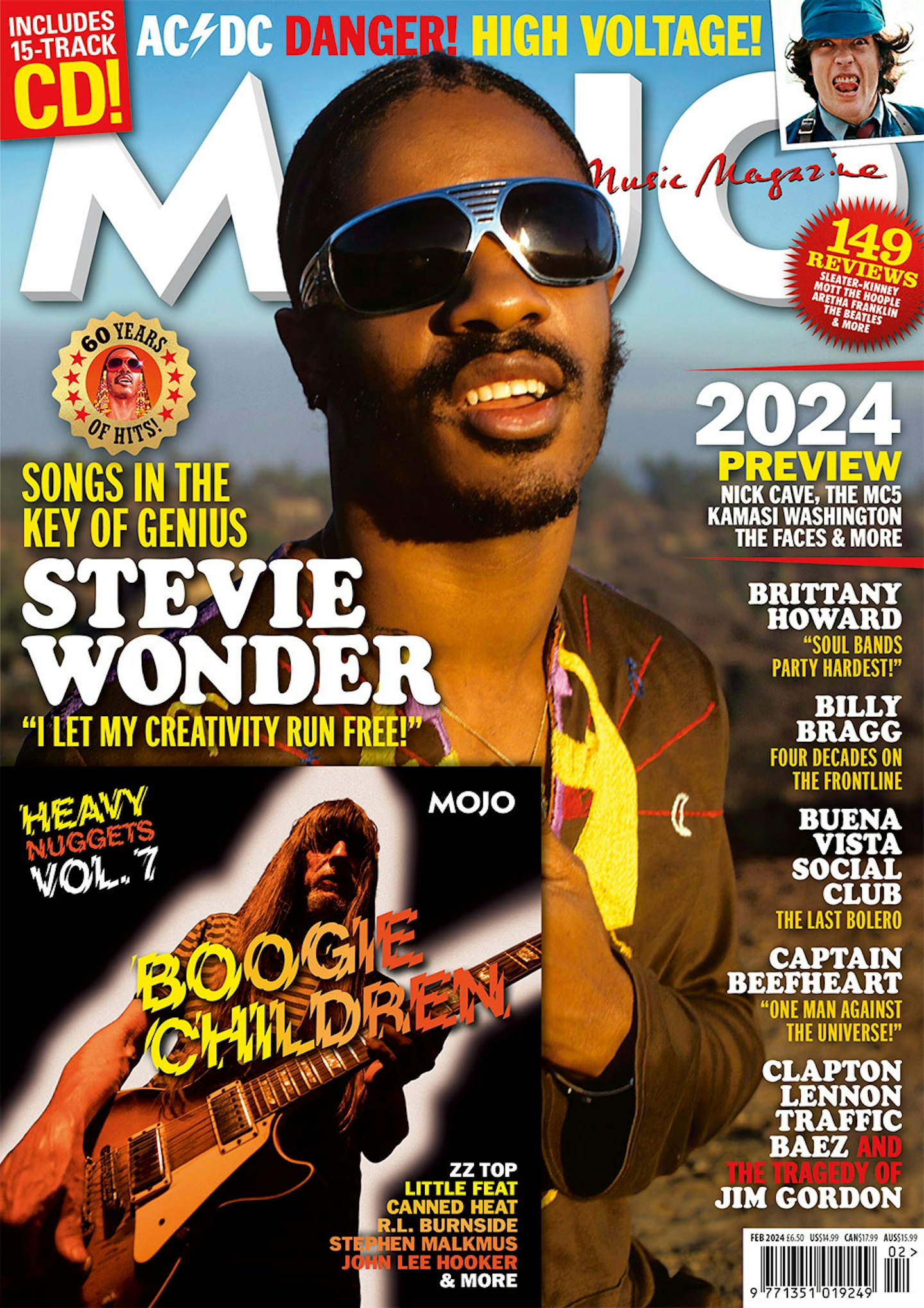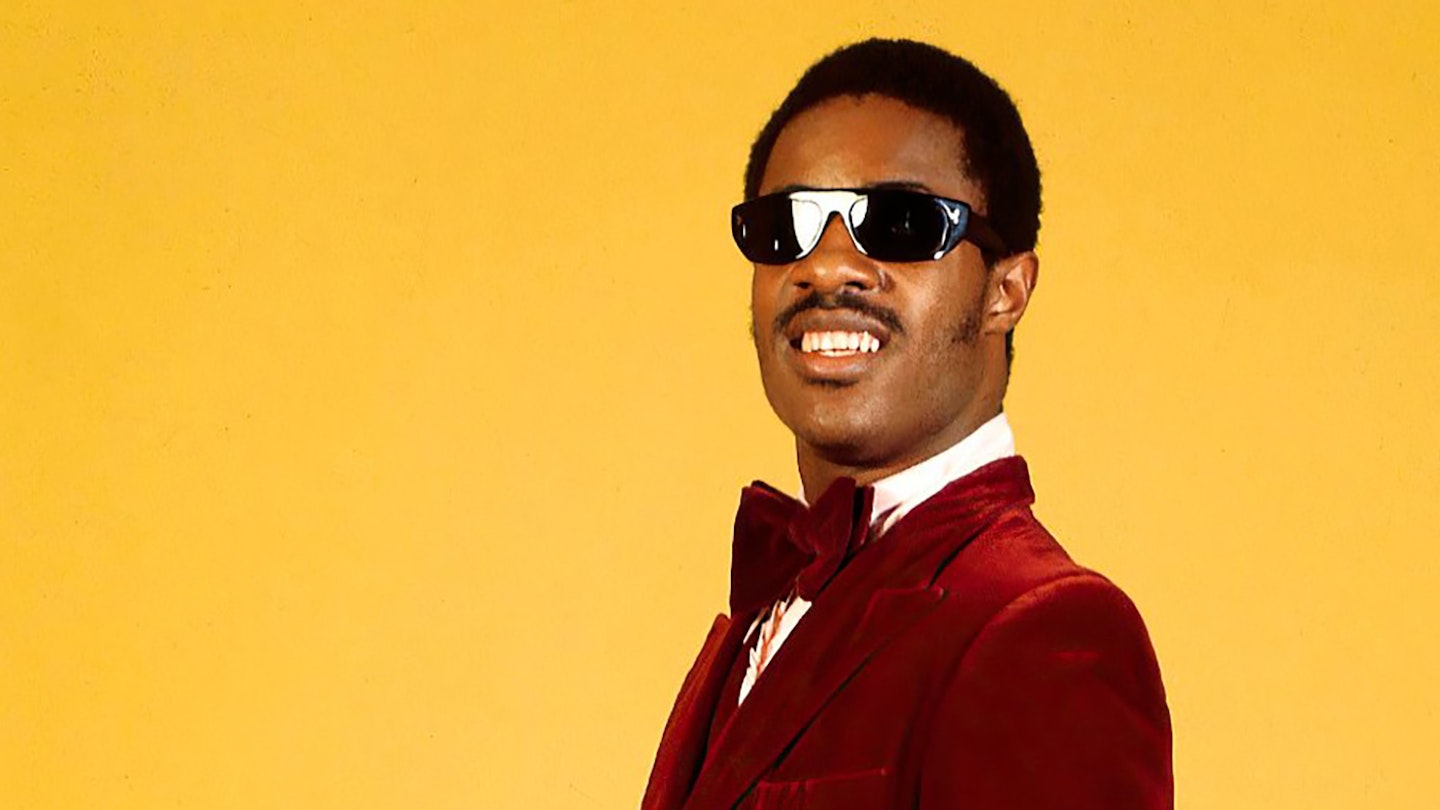Sixty years since Fingertips hit Number 1 and turned his young career around, Stevie Wonder is still working on music that bathes the soul, battles injustice, and blows the minds of his peers. How he got here is astonishing in itself: the blind prodigy who escaped Motown’s scrapheap twice to make some of the most beautiful and ambitious pop music ever conceived. Here, MOJO’s expert team of Wonderlovers pick a selection of deep-cuts which deserve revisiting…
1.
Lois
(from Never-Before-Released Masters From Motown’s Brightest Stars: The 1960s, 1986)
An early (1963) co-write –named for the Vandellas’ Lois Reeves – and an early sign of Wonder breaking away from Motown’s idea of him as Ray Charles’s Mini-Me. Soul lovers Mr and Mrs Wilson of Lincoln dug the yearning, Sam Cooke-ish fingerpopper so much they gave the title to their daughter, now MOJO soul maven, Lois Wilson.
2.
Music Talk
(B-side to High Heel Sneakers single, 1965)
Stevie vs the Funk Brothers? It’s almost that as the 15-year-old blasts his Hohner midway through this firecracker of a flipside (later to feature on the Up-Tight LP). Vocally or instrumentally, he won’t be intimidated by the Motown studio band’s pumping brass section or Benny Benjamin’s thunderous drums. “It’s the best way of talking that man has ever had!”
3.
Angel Baby (Don’t You Ever Leave Me)
(from Down To Earth, 1966)
No one does runaway joy quite like Stevie Wonder – witness this gorgeous, unjustly overlooked gem from 1966. Written by Sylvia Moy and Henry Cosby, Wonder’s life-affirming original of the song better known by Darrell Banks is a triumph of the Hitsville factory line, capturing the teen narrator in the flushes of first love and fully surrendering to it.
4.
Hey Love
(from Down To Earth, 1966)
One of Motown’s greatest love songs was initially hidden away as an album track, but when issued as a B-side the following year it was flipped by DJs on US black radio and hit the US R&B Top 10. Wonder’s adoring vocal on the co-pen with Clarence Paul put him up there with Marvin Gaye as one of the label’s top crooners.
5.
Every Time I See You I Go Wild
(from IWas Made To Love Her, 1967)
Recorded while Marvin Gaye was readying his single You, both tunes bidding farewell to any hopes Motown harboured of convincing the singers to become new Nat King Coles. Supper-club smooth it’s not, and the intensity of the mono mix – the B-side of ’67 single I’m Wondering –may be dangerous for anyone with a heart condition.
6.
More Than A Dream
(from Eivets Rednow, 1968)
The two best tracks from the cryptised Wonder’s easy listening career-diversion both have his name on the writing credits. The mellifluous How Can You Believe was later sampled on Madvillain’s Great Day, but More Than A Dream is where Stevie and his harp, riffing (surely?) on Ferry Cross The Mersey, get to mess up the bachelor pad. Groovy!
7.
I Don’t Know Why
(from For Once In My Life, 1968)
Packed with emotion, distortion and pain, this 167-second crescendo memorably finds its cuckolded singer crying, pleading and crawling “across cold, black earth”. On 45 in 1969, flipside My Cherie Amour was the bigger hit, but this sui generis Motown release rocks so hard the Rolling Stones’ cover version would have improved Let It Bleed.
8.
Keep On Running
(from Music Of My Mind, 1972)
“Something gonna get you… something gonna grab you…” Wonder’s faux-threatening intro, haunted by spooky synth stabs, resolves into something less sinister – it’s only his love that’s after you! phew! – but still thrilling. The panting, 137 bpm tempo keeps the ‘running’ theme going for a full 6:40, by which time you’ll think it’s you who’s had the workout.
9.
You’ve Got It Bad Girl
(B-side to Superstition single, 1972)
Relegated to Superstition’s undercard, this magical mellow groove – last track, side one of Talking Book – never received the attention it deserved. Wonder, who wrote the softly infectious song with occasional collaborator Yvonne Wright, played all the music himself; its layered synth sounds epitomising the Motown maestro’s burgeoning auteurdom.
10.
Cause We’ve Ended As Lovers
(from Stevie Wonder Presents: Syreeta, 1974)
A song-cycle chronicling the breakdown of their marriage, Syreeta’s second album centred around this Stevie-penned slow-burner, which sifted through fond memories and brooded over broken dreams, but also affirmed their friendship would endure. Indeed, Syreeta remained Wonder’s trusted friend, confidante and collaborator, guesting on his records until her death in 2004.
11.
Take A Little Trip
(from Perfect Angel (Deluxe Edition), 2017)
Under the pseudonym El Toro Negro, Wonder co-produced and played drums, piano and harmonica on Minnie Riperton’s Perfect Angel from 1974. He also wrote Take A Little Trip, a blurry psych-soul beauty advocating spiritual awakening. In 2017 this Wonder and Riperton duet version surfaced, their telepathic connection taking the song to a whole new level.
12.
Creepin’
(from Fulfillingness’ First Finale, 1974)
Tip-toeing along on asomnambulant groove (notwithstanding some eccentric snare hits, 0:16-0:18), this dreamy nocturne separates Fulfillingness’s uptempo Boogie On Reggae Woman and You Haven’t Done Nothin’. Again, the clouds of dreamy synths and bluesy harmonica solo are all Wonder’s own work, although Minnie Riperton contributes ethereal background vocals.
13.
Sleeping Alone
(from Steppin’, 1975)
Among those tapping the overflow of Wonder’s mid-’70s tune reservoir were The Pointer Sisters. Here, Wonder moonlights on his own song, supplying grunts, Rhodes, and (maybe) the subtly strange drums. In fact, everything in this muso bran tub is strange – the Pointer harmonies, the Latin-funk outbursts, the incongruous blues outro, and Wonder’s hyperactive solo from 2:11.
14.
Contusion
(from Songs In The Key Of Life, 1976)
Proof of the fecundity of the 21-track SITKOL package, this mostly instrumental jazz-fusion juggernaut sounds like Wonder digging the music of his friend Jeff Beck and Return To Forever. An outlier in Wonder’s canon, the title alluding to his near-fatal car accident in 1973, it showcases guitarist Michael Sembello’s fretboard-melting pyrotechnics.
15.
Race Babbling
(from Journey Through ‘The Secret Life Of Plants’, 1979)
If …Plants is generally a plea to slow down and embrace the natural world, Race Babbling – refrain: “This world is moving much too fast” – sits as a warning against accelerating modernism. Yet the future, surely, couldn’t be that bad, if soundtracked by Wonder’s super-streamlined proto-techno, neck and neck with Moroder and years ahead of the Detroit curve.
16.
As If You Read My Mind
(from Hotter Than July, 1980)
Wonder’s passion for Latin music inspired classics including Don’t You Worry ’Bout A Thing and Another Star, and even saw him sit in with Nuyorican heroes the Fania All-Stars in 1976. A later example of his love for Afro-Cuban sounds, this piano-driven banger’s restless salsa rhythms and call to “get happy” are irresistible.
17.
Do I Do
(from Stevie Wonder’s Original Musiquarium, 1982)
10:28 minutes of rapture, and tantalising evidence of an ’80s road mostly untravelled, as Wonder builds on SITKOL’s expansiveness, absorbs a few tricks from Off The Wall and Rapper’s Delight, enlists Dizzy Gillespie for a trumpet solo, and even has a go at rapping himself before, one assumes, the recording engineers collapse from exhaustion.
18.
These Three Words
(from Jungle Fever OST, 1991)
Wonder’s soundscape to Spike Lee’s movie showed he had his finger on the ’90s pulse, from the electro-funk of the title theme and New Jack Swing groove of Gotta Have You. Here, over a tickle of electric keys and a typically epic harmonic journey, he delivers a cinematic portrait of familial love, turning potential goo into gold.
19.
Treat Myself
(from Conversation Peace, 1995)
This joyful gem revisits the escapist theme Wonder first explored with the “mind excursions” of Bird Of Beauty, off Fulfillingness’ First Finale. This time, he’s using his imagination as a refuge from a world riven by poverty, war and bigotry, choosing instead “all the pretty places in my head”.
20.
Can’t Put It In The Hands Of Fate
(So What The Fuss/Republic ‘single’, 2020)
Wonder’s activist instincts, never far from the surface, welled up in this swinging, swingeing anthem for the nascent BLM movement. MCs including Rapsody and Busta Rhymes weigh in, but none put it as starkly as Wonder himself: “You say that you believe that All Lives Matter/I say I don’t believe the fuck you do.”
Compiled by: Stevie Chick, Danny Eccleston, David Hutcheon, John Mulvey, Charles Waring, Adam White, Lois Wilson.
A little more Stevie! Read the full story of the Motown Wunderkid-turned sensational soul visionary and auteur in MOJO’s latest cover feature, on sale now. More info and to order a copy HERE!

Picture: Redferns/Getty
